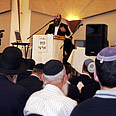
Does Judaism encourage sexual pleasure?
Question debated by many in religious society to be brought up for public discussion for first time in halachic conference for women
Many religious and ultra-Orthodox Jews perceive the sexual urge as a symbol of material (or even brutish) passion, and believe that a person aspiring for spiritual elevation should overcome this urge, or at least "settle for less."
The Puah Institute, which helps couples dealing with fertility problems, seeks to uproot this perception which its rabbis believe is inspired by Christianity. According to the institute's rabbis, pleasure is a mitzvah.
Under the title, "Femininity, Relations and Motherhood," the Puah conference will present two conflicting worldviews – one maintaining that the desire to enjoy sexual relations harms their sanctity, and the other asserting that sex is an inseparable part of the mitzvah.
The rabbis' conclude that the ideal situation is when each partner focuses on efforts to satisfy the other, thereby both benefit, without any feelings of guilt or selfishness.
Harming sexual performance
In addition, the institute will soon open a first course of its kind, in collaboration with Bar-Ilan University, aimed at training women as counselors who will guide couples facing sexual performance difficulties. These women are defined as counselors rather than therapists, as they are not recognized as sexologists.
Men were first trained for the job about two years ago, but over time rabbis realized that in some cases it would be immodest for a man to help a woman in this field.
Rabbi Menachem Burstein, head of the Puah Institute, explains the need for sexual counseling and guidance by rabbis. According to Burstein, couples who receive medical treatment seek his advice on relevant halachic questions, but he is not required to get involved in every stage. Sexual therapy which is not based on the Halacha, however, involves countless problems – making it impossible.
"A surrogate, for example, is customary in every treatment today, but there is no way to allow it," he demonstrates. "On the other hand, there is an opposite phenomenon in which people fail to cooperate with their therapist because they are afraid of halachic problems.
"Had they been treated by a male or female rabbi, they would have known that in their condition there are many things that could be allowed for the sake of the treatment."
Rabbi Burstein confirms that many religious couples with sexual performance difficulties (sensitivity, pre-ejaculation, etc) avoid going to counseling when the issue is not a clearly medical one or a fertility problem, due to the religious perception that pleasure is not important and perhaps even wrong. According to the rabbi, many philosophers and halachic rulers share a different opinion.
Overcoming psychological barriers
Part of the counselors' training and work is dedicated to dealing with this perception, which will be at the center of next week's conference in Jerusalem. In addition, the Puah Institute uses further methods to become more accessible to the public, in a bid to overcome the psychological and social barriers faced by religious and haredi couples seeking sex therapy.
One of the initiators of the counselors' course is Dr. Hannah Katan, a well-known gynecologist and sexologist in the religious sector and a member of the Israeli Society of Sex Therapy, who sees a certain openness towards the issue in recent years.
"The wide public often wonders if treating sexual dysfunction is problematic from a religious perspective, but the 'onah' mitzvah means that a husband is obligated to please his wife," she says. "Rabbis today encourage people to see professionals. The issue is being taken care of because it's all about strengthening the Jewish home."
Dr. Katan explains that sex therapists from the wide public and observant patients often speak "different languages," in addition to halachic problems which make the treatment more difficult. That is the main reason, she says, for training counselors who come from the same world of values and can understand the patient better.
The academic coordinator of the counselors' course is Dr. David Ribner, chairman of Sex Therapy Training Program at Bar-Ilan University's School of Social Work. The main need for such a course, he explains, stems from the fact that religious couples facing problems in that area usually go to a rabbi or instructor rather than to a professional, and therefore rabbis and educators must be provided with basic and up-to-date knowledge.
Dr. Ribner, who has a private sex therapy clinic, says he has witnessed a significant change in the religious and haredi public's attitude toward sexual pleasure over the past 40 years.
"Today there is much more openness than before, and anyone working in this field can see it," he says. "In the past, couples would seek treatment only if they had fertility problems, and today rabbis encourage them to seek treatment for other issues as well, because mutual pleasure has an important part in a relationship.
"The current problem is the lack of professional sources of information – therefore the counselors' course is so important."










